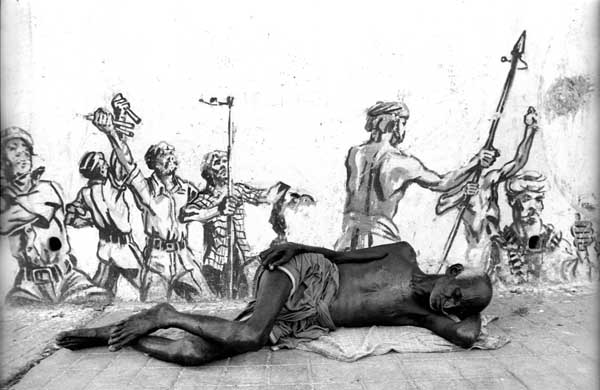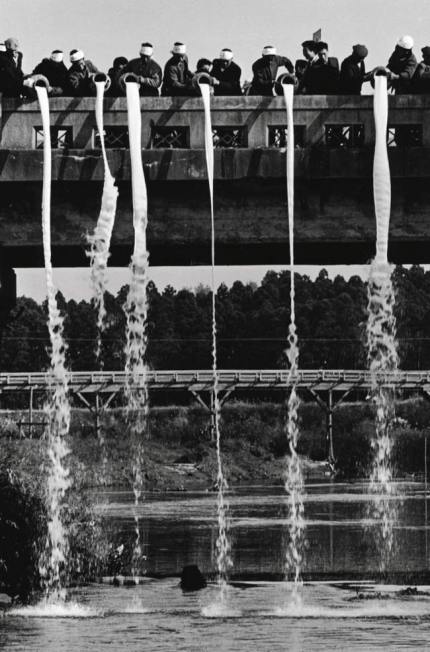![]()

Revolution ? Pablo Bartholomew
The Poverty Line
Tarapodo Rai
I was poor. Very poor.
There was no food to quell my hunger
No clothes to hide the shame of my naked body
No roof above my head.
You were so kind.
You came and you said
‘No. Poverty is a debasing word. It dehumanizes man.
You are needy.’
My days were spent in dire need.
My needy days, day after day, were never-ending.
As I grew weaker
Again you came.
This time you said.
‘Look, I’ve thought it over,
“Needy” is not a good word either.
You are destitute.’
My days and my nights, like a deep longing sigh,
Bore my destitution.
Cowering in the burning heat,
Shivering in the cold winter nights,
Drenched in the never-ending rains.
I went from being destitute to greater destitution.
But you were tireless.
Again you came.
This time you said
‘There is no meaning to this destitution.
Why should you be destitute?
You have always been denied.
You are deprived, the ever deprived.’
There was no end to my deprivation.
In hunger and in want, year after year,
Sleeping in the open streets under the relentless sky
My body a mere skeleton
Was barely alive.
But you didn’t forget me.
This time you came with raised fist
In your booming voice, you called out to me.
Rise, rise the exploited masses.
No longer did I have the strength to rise.
In hunger and in want, my body had wasted.
My ribs heaved with every breath.
Your vigour and your passion
Were too much for me to match.
Since then many more days have gone.
You are now more wise, more astute.
This time you brought a blackboard.
Chalk in hand, you drew this glistening bright long line.
This time you had really taken great pain.
Wiping the sweat from your brow, you beckoned me.
‘Look. See this line.
Below, far below this line, is where you belong.’
Wonderful!
Profusely, Gratefully, Indebtedly, I thank you.
For my poverty, I thank you.
For my need, I thank you.
For my destitution, I thank you.
For my deprivation, I thank you.
For my exploitedness, I thank you.
And most of all, for that sparkling line.
For that glittering gift.
O great benefactor!
I thank you.
Translated from Bangla by Shahidul Alam.
Category: exploitation
The Price for "Progress"
Subscribe to ShahidulNews
http://www.newint.org/issue372/exposure.htm

Shinzo Hanabusa is yet another artist to be featured in the upcoming festival of photography, Chobi Mela III. Hanabusa’s work on Japanese farmers provides a fascinating insight into the cost of ‘progress’, in a nation like Japan.
The Second World War had adversely affected farming in Japan. I began producing a documentary on farming in 1962. The farmers were not getting a fair price for their milk. Then Japan started importing powder milk and things got really bad. In 1966 I heard rumours that the farmers in Akita were setting up a resistance movement. Following newspaper leads I went over to the locality. I was very upset, when I saw them throw the milk from the bridge as a sign of protest, at the fact that they had been reduced to this. But a big publication, Ewanami Shoten, printed the photograph and it helped turn things around a bit, so I felt good afterwards. I have since become known as ‘The Milk Photographer’. I hope the publication of this photograph in Southern Exposure helps farmers around the world get a fair price for their produce.
Shinzo Hanabusa, Japan
Debunking the Expert Myth
Subscribe to ShahidulNews
![]()
Experts determine our lives. They decide what we should wear, who we should have as partners, how many children we should have, who we should take loans from. They determine the very characteristics of a ‘civilised society’.
Seven years after I wrote the original piece, this video further cracks the expert myth. A three part series.
—————————————————-
Journalists too fall into the category of ‘experts’, and have considerable clout. While ‘expertism’, which works to preserve the power structures within society, is a trap a concerned journalist will be wary of. There are those within the media, who use the extra clout of a press pass to obtain favours, and use their expert status to sell ideas to a misinformed public.
A journalist’s job is to explain, in simple terms, complex issues in a manner, which is compelling, engaging and meaningful to people, to debunk expertism. In order to do so she needs to gather a fair amount of knowledge on the area of expertise that she reports on. She needs to wade through the jargon, to get to the essential facts. She needs to make sense of numerical data, and have enough rigour in her analysis so it can stand up to intense scrutiny. She needs to interpret things in language that is commonly understood, and to be aware of the cultural contexts that may give altered meanings. Here lies a trap, for in this process of simplification, she may choose metaphors, which may not be wholly accurate; she may leave out data, which may be pertinent; and she may shift emphasis, to make a point. Her position wields immense power. As a knowledge broker she can influence people’s opinion. Her politics may determine the course of social action.
Changing their destiny
Subscribe to ShahidulNews
www.newint.org/issue287/contents.html
Letter from Bangladesh
Changing their destiny
Shahidul Alam travels with the poor who chase a dream to distant lands.
They all have numbers. Jeans tucked into their high-ankled sneakers. They strut through the airport lounge, moving en masse. We work our way up the corridors leading to the airplane, but many stop just before boarding. The cocky gait has gone. The sad faces look out longingly at the small figures silhouetted on the rooftops. They wave and they wave and they wave. The stewardess has seen it all before and rounds them up, herding them into the aircraft. One by one they disengage themselves, probably realizing for the first time just what they are leaving behind.

As in the case of the others, his had been no ordinary farewell. They had all come from the village to see him off. Last night, as they slept outside the exclusive passenger lounge, they had prayed together. Abdul Malek has few illusions. He realizes that on $110 a month, for 18 months, there is no way he can save enough to replace the money that his family has invested.
But he sees it differently. No-one from his village has ever been abroad. His sisters would get married. His mother would have her roof repaired, and he would be able to find work for others from the village. This trip is not for him alone. His whole family, even his whole village, are going to change their destiny.
That single hope, to change one’s destiny, is what ties all migrants together ? whether they be the Bangladeshis who work in the forests of Malaysia, those like Abdul Malek, who work as unskilled labour in the Middle East, or those that go to the promised lands of the US. Not all of them are poor. Many are skilled and well educated. Still, the possibility of changing one’s destiny is the single driving force that pushes people into precarious journeys all across the globe. They see it not merely as a means for economic freedom, but also as a means for social mobility.
In the 25 years since independence the middle class in Bangladesh has prospered, and many of its members have climbed the social ladder. But except for a very few rags-to-riches stories, the poor have been well and truly entrenched in poverty. They see little hope of ever being able to claw their way out of it, except perhaps through the promise of distant lands.
So it is that hundreds of workers mill around the Kuwait Embassy in Gulshan, the posh part of Dhaka where the wealthy Bangladeshis and the foreigners live. Kuwait has begun recruiting again after the hiatus caused by the Gulf War, and for the many Bangladeshis who left during the War, and those who have been waiting in the wings, the arduous struggle is beginning. False passports, employment agents, attempts to bribe immigration officials, the long uncertain wait.
Some wait outside the office of ‘Prince Musa’ in Banani. He is king of the agents. His secretary shows me the giant portraits taken with ‘coloured gels’, in an early Hollywood style. She carefully searches for the admiration in my eyes she has known to expect in others. She brings out the press cuttings: the glowing tributes paid by Forbes, the US magazine for and about the wealthy, the stories of his associations with the jet set. She talks of the culture of the man, his sense of style, his private jet, his place in the world of fashion.
Apart from the sensational eight-million-dollar donation to the British Labour Party in 1994 ? which Labour denies, but which the ‘Prince’ insists was accepted ? there are other stories. Some of these I can verify, like the rosewater used for his bath, and the diamond pendants on his shoes (reportedly worth three million dollars). Others, like his friendship with the Sultan of Brunei, the Saudi Royals and leading Western politicians, are attested to by photographs in family albums.
He was once a young man from a small town in Faridpur, not too distant from Abdul Malek’s home or economic position, who made good. Whether the wealth of the ‘Prince’ derives mainly from commissions paid by thousands of Maleks all over Bangladesh or whether, as many assume, it is from lucrative arms deals, the incongruity of it all remains: the fabulously wealthy are earning from the poorest of the poor.
Whereas the ‘Prince’ has emigrated to the city and saves most of his money abroad, Malek and his friends save every penny and send it to the local bank in their village. Malek is different from the many Bengalis who emigrated to the West after World War Two, when immigration was easier and naturalization laws allowed people to settle. Malek, like his friends, has no illusions about ‘settling’ overseas. He knows only too well his status amongst those who know him only as cheap labour. Bangladesh is clearly, irrevocably, his home. He merely wants a better life for himself than the Bangladeshi princes have reserved for him.
An old friend of the NI, Shahidul Alam is guiding light of Drik, a remarkable photographic agency in Dhaka.
